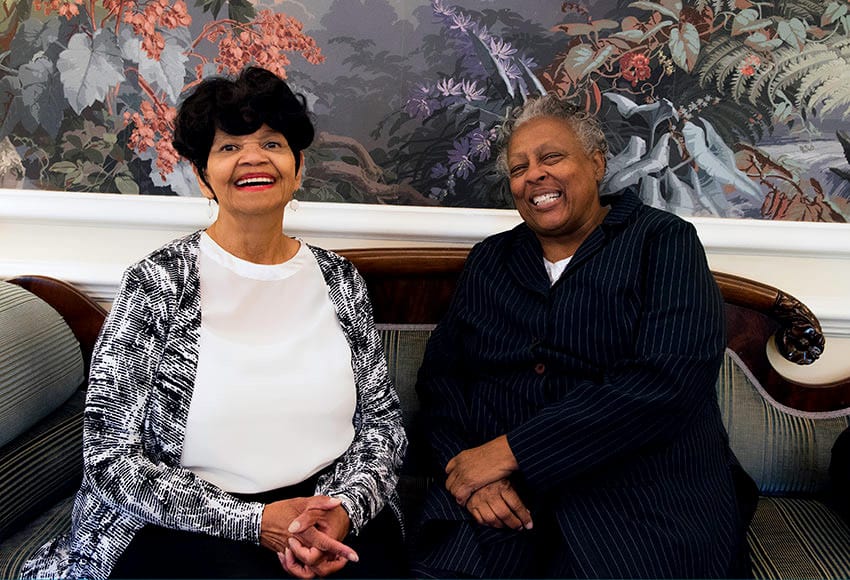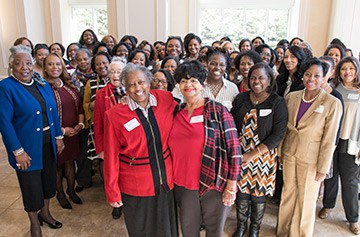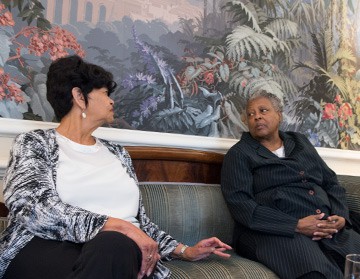Meet Converse’s First Black Graduates: Freida Rodgers Byrd and Margaret Jones Swindler

The 2018 academic year marks the 50th anniversary of our first Black students enrolling at Converse College. Throughout the year we are reflecting on the courage of these women, our heritage and growth, as well as the work still ahead of us. This is the first in a series featuring our alumnae.
Listening to Freida Rodgers Byrd ’72 and Margaret Jones Swindler ’72 banter back and forth you would think they are the best of friends. Yet, they were just recently reunited, first for lunch with President Newkirk and then for the February 2018 kickoff of the 50th anniversary at ‘Celebrating Courage: A Panel Discussion with Black Alumnae.’
“It’s always fun to meet Converse students,” Freida said. “They even wanted to do selfies with me at the event! One lady asked for my autograph and she actually said, ‘I came to meet you.’”
Margaret and Freida have a lot more in common than just sharing the same graduation year from Converse College — they were the first two Black women to graduate from Converse. These trailblazers changed Converse history. According to an article in The Washington Post, colleges today are the most diverse they’ve been since desegregation began six decades ago.
I just didn’t really think about the integration being a part of my agenda.
Yet, Margaret and Freida never intended to be trailblazers or heroes. They simply wanted an education. Their similarities go on: They have children the same age, but no grandchildren; they both can read music; both recently had cataract surgery; both are introverts; both consider themselves “city-country girls”; neither have lived outside South Carolina.
Margaret, an Elder at Cornerstone Baptist Church, blessed the meal we shared before their interview. I sat back and listened as she and Freida caught up with one another, discussing everything from their toughest teacher at Converse and the challenges of learning to swim, to the state of the world today and racism.
 Freida talked about the year that she and Margaret came to Converse: 1968. “That was the year Martin Luther King, Jr. was killed,” Freida said. “I remember exactly what I was doing when it came on TV. Then Robert Kennedy was assassinated, so it was one of those years.”
Freida talked about the year that she and Margaret came to Converse: 1968. “That was the year Martin Luther King, Jr. was killed,” Freida said. “I remember exactly what I was doing when it came on TV. Then Robert Kennedy was assassinated, so it was one of those years.”
Freida was planning to go to Howard University–she had even talked to a fellow Howard freshman who would be her roommate there. But, despite being an honor student in high school, Freida was not able to get enough financial aid to cover the expenses.
“I got into Converse less than two weeks before classes started; I thought I’d only stay for a year,” Freida said. “I had lived in Spartanburg all my life and thought Converse was only a music school.”
Freida began studying biology – a major not just rare for a woman, but especially for a Black woman. “I took classes in Kuhn when it was brand new,” she said. “Our freshman class was the first class to go in there.”
Freida became a lab assistant during her very first year. “I’d go in there and feed the pigs and work with formaldehyde,” she explained.
“After that first year, everybody had treated me so well that I applied for a job. I applied to a local clinic but was told they weren’t taking any more people. They decided to interview me anyway. She interviewed me and another Converse student who was White. We were interviewed at the same time, which was odd. The interviewer walked into the room and didn’t say anything for a few minutes. She looked at me, then she looked at the other girl, then blurted out, “’When did Converse integrate?’”
Without missing a beat Freida answered, “This past year; I just finished my first year.”
The clinic hired both students.
“That’s where I worked for the next four years,” Freida said proudly. “After that, I knew I was staying at Converse. Converse has a good name not only around these parts but other places as well.”
Margaret emphatically agreed, “Yes it does.”
Margaret came to Converse after receiving a four-year scholarship from Walter Montgomery and Spartan Mill. “To be honest with you I wanted to get out of the state of South Carolina and not come back,” Margaret said, laughing.
 She described being questioned by an individual in admissions about why she had received such a prominent scholarship with less-than-perfect grades. “She had a problem with me being here, and let me know she had a problem with it,” Margaret explained. “She said what she had to say. But after that, she would come and check on me. We became friendly after that.”
She described being questioned by an individual in admissions about why she had received such a prominent scholarship with less-than-perfect grades. “She had a problem with me being here, and let me know she had a problem with it,” Margaret explained. “She said what she had to say. But after that, she would come and check on me. We became friendly after that.”
This poise comes naturally to Margaret. “You learn to handle those situations with grace because that’s how we were brought up,” Margaret said. “We knew our place; we were taught what to say, what to do and go on because that’s life for a Black person. We were conditioned from the time we were small.”
Freida nodded in agreement. “We had gotten used to a separate this and a separate that,” she said. “We just accepted it. You also learn that you have to be two or three times better education-wise.”
“I came from an all-black high school to an all-white college,” Freida continued. “I knew I was going to have to work harder because they told us we had inferior books and inferior teachers. So, when I got to Converse and learned what the students knew, and saw how they behaved in class I thought, ‘I’m OK.’”
Freida speculated about how much preparation Converse faculty must have done prior to the integration process. “I didn’t run into anybody who had a problem with us being here,” she said.
Margaret said, “I just didn’t really think about the integration being a part of my agenda. I’m not a bodacious person. Freida isn’t either. We do what we have to do. If you recognize us, fine. If you don’t, fine.”
People who knew we were here kept up with us. They were so proud of us.
Margaret and Freida only had one class together during their time at Converse. Freida said, “People would say to me, ‘Where is Margaret?’ I’d say, ‘I don’t know; we’re not attached at the hip.’ They thought if you see one, you’d see the other.”
But with Freida studying biology and Margaret ultimately majoring in sociology, the only class they had together was modern dance.
Freida asked Margaret if she had Dr. Kimball for English. Margaret nodded her head yes and Freida recalled how Dr. Kimball would sit on a desk and announce the grades from the previous assignment to the class.
“He wouldn’t call names but he would say the grade ranges,” Freida said. “That was the first time I made a D- on a paper – I had worked so hard on it – I would write and edit, write and edit. I am not a writer; I’m a science person.”
Shaking her head, she said, “To get that kind of grade – I was devastated. I was the only Black person in the class and I was so afraid he was going to say my name. I just felt like everybody knew it was me anyway. But they didn’t.”
Margaret reminded her, “Dr. Kimball had a reputation for being tough.”
Though Freida and Margaret didn’t live on campus they did attend some college events. “It was a Friday or Saturday night and they drove us up to Davidson for a social,” Freida related. “They had all these guys lined up on one side and all the girls on the other. And the guys were supposed to come to get you to dance. Now, we were Black. Here we are in this room full of White people. Do you really think anyone was going to ask us to dance? So, we held up the wall.”
“I will never forget the first time I ate in the dining hall,” Freida said. “We had people actually waiting on us! They had the food in serving bowls and they would bring you a dish to fix your plate. The wait staff – those Black people were so proud of us. Still to this day.”
Freida went on to say, “My daughter-in-law – her dad knew me. When we met the first time he said, ‘I know what year you graduated – I used to see you when I’d come pick my mom up from working at Converse.’ People who knew we were here kept up with us. They were so proud of us.”
Margaret agreed. “We talk to everyone no matter what their status is; that’s how we were raised,” she said. “You treat them right. I will say one thing we learned from Converse College is how to drink tea with no sugar. That is some of the worst tea I’ve ever tasted,” she said, chuckling.
Margaret and Freida laughed while remembering one of the mandatory physical education requirements: swimming. Freida talked about how challenging it was to learn how to swim; she had never been in water deeper than a bathtub. “It was really intimidating because the majority of the class, except for me and one other girl, knew how to swim,” she said.
They agreed the most daunting part of getting to graduation was the oral comprehensives. “You sat in a room with all of the department faculty and they could ask you anything,” Freida explained. “You had to be ready to answer anything about your major.”
We are glad that we came to Converse and opened the doors for other people. But we never thought we were doing anything special.
Thirty-eight years after graduating, Freida’s own daughter, Erica, graduated magna cum laude from Converse, majoring in interior design as a Converse II student. “I didn’t suggest she come here,” Freida said. “She made the decision on her own.”
Margaret interjected, “It’s so interesting to hear Freida talk because I didn’t know about her history.”
“My mom taught me that women were to be seen and not heard; so I didn’t do a lot of talking,” Margaret responded. “That’s what we were taught back then.”
“I found my voice after two years at Converse,” Freida said. “I realized I can do some things – I can talk. All this has been bottled up inside but now I can say some things. So, I started expressing my opinion. Once I started teaching I had to be more verbal. Teaching is like preaching; once you’ve been over and over the same material, you can just get up there and go.”
Both introverts, Margaret and Freida talked about the importance of the need to feel safe before expressing themselves. “I had to learn to speak up and I spoke up more here in college,” Margaret said, but noted, “Though doing more observing than speaking is not necessarily a bad thing.”
Freida agreed. “Department heads would ask for my advice at work and say, ‘I know you’re going to look at this from all sides and not make a snap decision.’ There’s a place for all of us.”
Both women agreed that they were at Converse to get an education so they could get a job. Freida met her future husband while she was at Converse. Years later he told Freida he knew better than to suggest marriage while she was at Converse because she committed to finishing college. Freida still thinks about coming back to Converse to pursue a master’s degree, but after a long teaching career, she welcomes having some downtime.
Margaret, who once considered becoming a neurosurgeon and going into the military, found a different calling. She became an Elder at Cornerstone Baptist Church. She is determined to finish two master’s degrees she started pursuing. “I need to prove to me that I can do it,” she said.
Margaret reflected back to a job she had in the early 80’s. She was a census taker and had been assigned to a territory between Inman and Campobello; a racially-charged area known as ‘Lil Chicago.’
While driving up a particular road one day, Margaret encountered a dangerous situation. “There were men waiting for me on a side road and the Lord told me I shouldn’t go up that hill,” she recounted. “I don’t know what would have happened to me if I’d gone up that driveway, but there were four or five of them waiting.”
A woman nearby warned her about the area she was in. “This lady schooled me,” Margaret said. “She said to me, ‘Do you know where you are? You’re in Lil’ Chicago. This is Ku Klux Klan country.’ She took the time, that White lady took the time to tell me what was what. The word had gotten around that I was out doing a census. They were waiting for me on that little side road.”
Freida shook her head at the incident. “Racism is a little subtler now than it used to be,” she said. “It’s not as overt. But it’s still here.”
“A lot of young people today don’t know what we went through,” Freida continued. “They think it’s behind them; that it’s history.”
“We are glad that we made the step – that we came to Converse and opened the doors for other people,” Margaret said. “But we never thought we were doing anything special. We just wanted an education.”